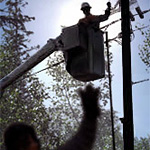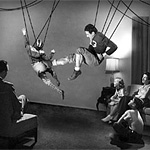The thought occurs to me: What precisely would it take to incite someone to physical assault?
Oh, that’s not how it starts, of course. It begins with the wind whipping up and felling the clothing store’s outdoor display, and myself instinctively lending a hand to straighten it back out. “Hey, thanks!” the sales girl says. “You didn’t have to, you know.” Sensing a turn in the weather she drags the entire thing back into the store and, already enlisted, I hold the door for her.
So, gratitude, and with it the familiar companion thought: How easy would it be to spoil this gratitude? Could I turn it into loathing with something as quick as a mock lunge and a snarl? Or how about if I began to tip over the clothes racks systematically, my face a mask of dull determination? Destroy.
The compulsion to break a good thing is strong, and it’s something that’s been ingrained in me since childhood.
In the summer of 1995 I’ve just bought my first CD player. CDs are still in their infancy, and I’ve saved up my allowance for nearly a year to buy into the phenomenon. The first unbidden thought–I remember it clearly–occurs to me as I remove strips of adhesive and sheets of protective plastic from the new appliance. Break it. I sit back on my bed and admire the digital pyrotechnics on the front face of the CD player. Drop it. Push it. Stab it with the screwdriver.
I press Eject and watch the tray slide out for the first time, admiring the mechanism, the way the little motor whirrs as the CD tray slides smoothly out and snaps into place, hungry. And vulnerable. The tray must be sturdy enough to support the weight of my hand. But what if I lean on it? Or how about if I raise my fist high and bring it down on the tray with the force of a sledgehammer?
Base needs will not be denied. The thoughts come naturally, but survival–sustainability–is most often a matter of control… or at least of moderation. I may leave my CD player, my television set, my half brother intact, but not a day will go by when I don’t at least consider the alternatives.
I’ve been thinking about it again lately. A week ago I receive a kind note from a client after completing a simple wedding website for his family. “I wanted to thank you,” he writes, “for helping us to commemorate this family event…” And so on. A real note on real paper, just like they used to do in movies. Not only that, but the words are hand-written–and what letters! His script is conservative, but elegant, and written with unwavering consistency. Less than an hour later and I’ve already fired up my font utility, and am busily converting his letter into my own private alphabet.
Now, is it a show of questionable judgment to respond to his letter in kind? That is to say: in his own handwriting? I don’t think the answer is absolute. “Hi!” I write. “I enjoyed doing the work for you–particularly because I got my own font out of it! You’ll notice that I’m using your handwriting even now, and I’ve already written to several of my other clients with it!”
His response–a typed letter just a few days later–is absolute: I am to cease using his handwriting immediately, under threat of physical retaliation.
Finally, here is something I can relate to. I place this letter on the table next to the original thank you letter, and my eyes flit from one to the other, savoring the causation that turns the sweet sour. And I am giddy for it. I’m also glad that I’ve stumbled on a means of channeling my impulse–this will satisfy me for a while.
Still, these needs, integral to myself, are not inherent to humanity. So, what specifically is the root cause? Surely my formative years were not free of perception-altering influences.
Was it my fractured adolescence, being placed in a chain of foster homes as I watch each time the promise of something new wither inevitably into disappointment and loss? Possibly… but that explanation doesn’t wholly satisfy.
Or perhaps it’s watching, over the years, my teachers’ eyes as they attempt to harness and cultivate my preternaturally advanced intellect. So bright and full of promise they are at the beginning, but soon realizing–without exception–that they’re simply not up to the task. Now we’re getting somewhere, but again, there are pieces missing from the puzzle.
How about the world class bodybuilding then? Not likely? Consider what the highly-illegal offshore camps drum into us from the start: In order to build strength you must destroy the muscle, and then allow it to rebuild itself. And then destroy it again. Repeatedly. Forever. Strength through destruction. Perfection through pain.
The answer dovetails nicely with the rest of my understanding of the world. My tendency toward destruction then is the result of my intent to make stronger my relationship with something of value, my disappointment of watching hope fade into loss, and my fear of seeing the new become mundane.
That and the prolonged, ritualistic steroid abuse.
 When I awake there’s shouting, and for a moment it’s 1983, and I’m back at the Institute holding an oily rag in one hand and a canteen of gasoline in the other. Then I remember that they never got any charges to stick, and I shake the remnants of sleep from my skull.
When I awake there’s shouting, and for a moment it’s 1983, and I’m back at the Institute holding an oily rag in one hand and a canteen of gasoline in the other. Then I remember that they never got any charges to stick, and I shake the remnants of sleep from my skull. Having returned from my interpretive dance motion capture session in Brussels, and with an extra free week on my hands still, I have decided to spend my time on a new campaign to urge the medical community to perform a new kind of cosmetic surgery. This is the text of my letter.
Having returned from my interpretive dance motion capture session in Brussels, and with an extra free week on my hands still, I have decided to spend my time on a new campaign to urge the medical community to perform a new kind of cosmetic surgery. This is the text of my letter. Back in the early forties–1946 was when it all started for us–kung fu by wire was an art form in its infancy. In fact it’s fair to say that it wasn’t yet an art form, but rather a humiliating form of family torture. At least that’s how I remember it.
Back in the early forties–1946 was when it all started for us–kung fu by wire was an art form in its infancy. In fact it’s fair to say that it wasn’t yet an art form, but rather a humiliating form of family torture. At least that’s how I remember it. I don’t trust the cult at the end of my street. Last week that was the worst of my problems, and I wish it were still. For the past week I’ve spent my nights with my ear pressed to my bathroom floor… but I get ahead of myself. Perhaps some history would help to illustrate how things have taken a turn for the worse.
I don’t trust the cult at the end of my street. Last week that was the worst of my problems, and I wish it were still. For the past week I’ve spent my nights with my ear pressed to my bathroom floor… but I get ahead of myself. Perhaps some history would help to illustrate how things have taken a turn for the worse.